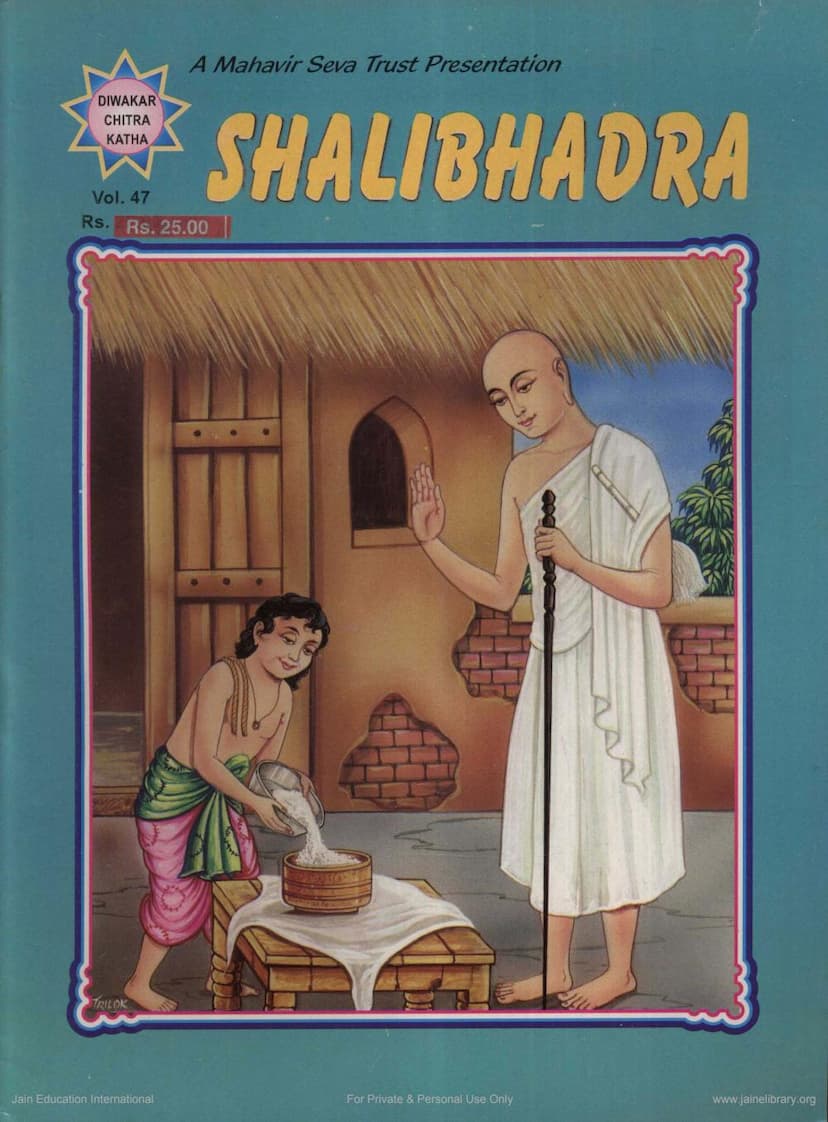Shalibhadra Diwakar Chitrakatha 047
Added to library: September 2, 2025

Summary
Here's a comprehensive summary of the Jain text "Shalibhadra Diwakar Chitrakatha 047":
This comic book, authored by Shrichand Surana 'Saras' and published by Mahavir Seva Trust Mumbai, tells the story of Shalibhadra, a legendary figure in Jainism renowned for his extraordinary wealth and even more extraordinary renunciation.
The narrative begins by highlighting Shalibhadra's immense riches, to the point where his wealth has become a common proverb. However, the true marvel is his profound detachment and unwavering willpower in abandoning this luxury. As a young man, accustomed to comfort and shielded from hardship, he suddenly embraced severe austerities. His practices were so rigorous that his mother couldn't recognize him due to his emaciated state. Bhagavan Mahavir himself praised him with the epithet Mahasatvashali (endowed with paramount strength).
The story then shifts to Shalibhadra's previous birth, where he was born as Sangam, the son of a widowed milkmaid. Sangam's life was simple, tending to cows. One day, he tasted kheer (a sweet rice pudding) prepared by his friend Puran's mother. Craving this delicacy, he insisted on having it, despite his mother's poverty. Through the kindness of neighbors who contributed ingredients, Sangam got his kheer. However, his excessive consumption and subsequent greed led to a stomachache and ultimately, his death. This tragic event emphasizes the consequences of attachment to worldly pleasures.
The narrative then transitions to Shalibhadra's birth in his next life as the son of Gobhadra, the wealthiest merchant in Rajagriha. He was named Shalibhadra, inspired by his mother's dream of abundant rice plantations. He received an excellent education and, upon reaching adulthood, was married to thirty-two beautiful girls simultaneously.
While living in his opulent palace, Shalibhadra was visited by Bhagavan Mahavir. Inspired by the discourse, Shalibhadra felt a strong sense of detachment and expressed his desire for initiation. He sought his mother Bhadra's permission, who initially expressed concern about the hardships of an ascetic life. However, upon seeing his firm resolve, she advised him to renounce his comforts gradually.
Following his mother's advice, Shalibhadra began renouncing one wife each day along with associated comforts. During this period, his sister, Subhadra, married to minister Dhanya Kumar, became distressed by her brother's imminent renunciation. Dhanya Kumar, upon hearing Subhadra's lamentations and her criticism of Shalibhadra's gradual renunciation, was inspired to take immediate and complete renunciation. He went to Shalibhadra's mansion and challenged him to renounce the world all at once. Both Shalibhadra and Dhanya Kumar then approached Bhagavan Mahavir for initiation.
After their initiation, Dhanya and Shalibhadra engaged in rigorous austerities, including prolonged meditation. Bhagavan Mahavir instructed them that austerities and meditation were the keys to shedding karmas.
On Bhagavan Mahavir's return to Rajagriha, Dhanya and Shalibhadra, now ascetics, sought permission to collect alms to break their month-long fast. They went to Bhadra's house, but due to their emaciated and altered bodies from austerities, they were not recognized. Bhadra left in her chariot without offering them alms.
Later, as they left the city, they encountered an aged milkmaid who, filled with an inexplicable motherly love, offered them curd as alms. Bhagavan Mahavir then revealed to Shalibhadra that in his previous birth, he was Sangam, and the milkmaid was his mother, Dhanna. He explained that his birth as the son of Gobhadra and Bhadra was due to the merit of that past act of charity.
The story concludes with Dhanya and Shalibhadra seeking Bhagavan's permission to undertake the ultimate vow of Padapogaman Santhara (fasting unto death). They climbed Vaibharagiri hill and commenced this final austerity. Bhadra and King Shrenik arrived to pay homage and were informed that the ascetics had not received alms at their home. Bhadra was filled with sorrow, regretting her inability to offer her son food even when he came to her door. King Shrenik consoled her, emphasizing the spiritual merit of her son's path to liberation and her pride as his mother.
The story highlights key lessons:
- The immense benefit of charity given with pure and pious feelings, where the intention is more important than the value of the offering.
- True joy and freedom are found in spiritual experience and detachment from worldly pleasures, not in material wealth. To become one's own master requires shedding dependence.
The book also includes an interesting tale about a merchant and accountant, illustrating the importance of legible writing, and a section on the origins of musical notes (svars) and their association with various beings and non-beings.